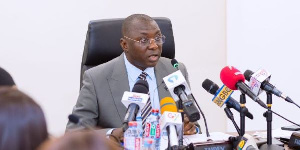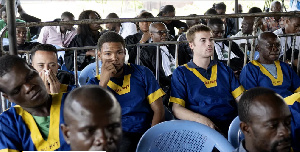- Home - News
- Polls
- Year In Review
- News Archive
- Crime & Punishment
- Politics
- Regional
- Editorial
- Health
- Ghanaians Abroad
- Tabloid
- Africa
- Religion
- Election 2020
- Coronavirus
- Photo Archives
- News Headlines
- Press Release
General News of Thursday, 28 July 2022
Source: GNA
Border communities should be vigilant to prevent violent extremism - WANEP
Dr Festus Kofi Aubyn, Regional Coordinator, Research and Capacity Building of the West Africa Network for Peacebuilding (WANEP) has called for vigilance among the citizenry particularly those in border communities to prevent violent extremism.
He said alertness and management of their grievances were key to limiting their risks of exposure to extremist and terrorist infiltration and recruitment.
“Violent extremists would usually exploit grievances of people to radicalise them to join their groups,” Dr Aubyn said.
Dr Aubyn was speaking to the Ghana News Agency on the sidelines of a 3-day workshop on preventing violent extremism and terrorism for women and youth-led Micro, Small and Medium Scale Enterprises in Ketu South.
He said considering the increasing acts of violence extremism in neighbouring countries like Togo and Burkina Faso, both government and citizens could not afford to take anything for granted.
Dr Aubyn said: “countries surrounding us are witnessing acts of violent extremism. It's evolved from 2009 in Nigeria to Mali, Burkina Faso and it's moved to coastal areas like Benin and Togo and, Ghana is not immune to it.
"It calls for vigilance because anybody can be a violent extremist, especially so, because they initially will seek to address your grievances and by the time you get to know, it may be too late.
“While we call on people in border communities like Ketu South for instance to come together to support government's efforts at preventing the threat, government must also be seen to be addressing root causes and drivers of violent extremism which often include socio-economic issues, discrimination, marginalisation, poor governance and human rights violations by security providers.”
Dr Aubyn said at all costs, violent extremism must be prevented from taking a hold in the country because its impacts could be disastrous.
Dr David Normanyo, Volta Regional Executive Secretary, National Peace Council (NPC) in his presentation on “Understanding conflict and conflict prevention,” said there would always be conflict because people come from diverse backgrounds, thus, prone to perceiving and understanding issues differently.
Dr Normanyo concluded that conflict itself was not bad, “it's just what it is” and could be negative (turn violent) or positive (cause social change) depending on the approach used in resolving it and called on participants to always choose non-violent means in resolving conflicts.
The three-day workshop organised by the NPC with funding from the United Nations Development Programme (UNDP) would take the carefully selected participants from the Municipality through presentations, including Prevention of violent extremism, Citizens rights and responsibilities and Identification of practical risks and threats to border communities with the aim to build their capacity to embrace peace, promote social cohesion, and to prevent violent extremism.











